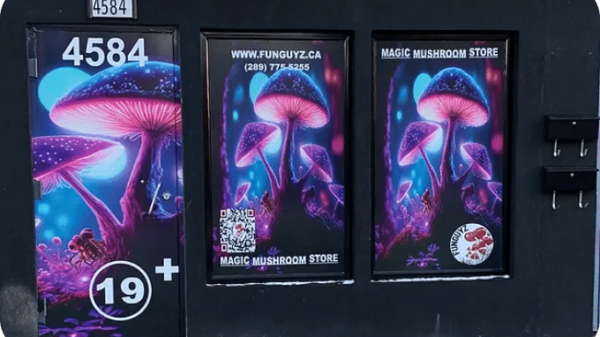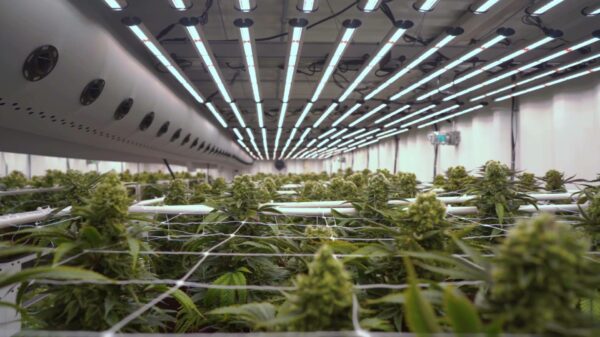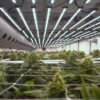WeedMD Inc. (CSE: WMD) is a Canadian cannabis company which has attracted attention primarily for its differentiation in the medical sector, and for its low-cost, scaled production model.

WeedMD CEO Keith Merker. All photos courtesy of WeedMD.
On Friday, we spoke with the company’s CEO Keith Merker to answer some questions about his company and where it stands on polarizing issues that have generated derision in the industry.
Merker told Mugglehead his stance on the taxation of medical cannabis, how he feels about the legacy cannabis industry and what needs to happen to move the industry forward.
He also explained what happened with the wobbly rollout of his company’s acquisition of Starseed, and why WeedMD’s differentiated medical channel is a recipe for success in 2020 — a year that some analysts predict will leave many cannabis companies with shuttered doors.
The interview has been edited for length and clarity.
So, for those who don’t know, can you explain a bit about your personal background and why you got into the cannabis industry?
I’m sort of an accidental tourist in the cannabis space, to be honest with you. I’m actually for better or for worse a guy who comes from a background in finance and has done a number of successful and some less successful entrepreneurial ventures over my career, outside the time I’ve spent strictly in institutional finance, largely based out of Toronto.
At one point in my life, when I had a daughter who was three, which was about six years ago, my wife looked and me and said ‘You gotta stop.’ It was a highly stressful role I was in. We needed a change, so we actually moved up to the cottage and flipped the script on the normal way of approaching life.
We lived up there and I started consulting for a number of small companies, which is really where my passions lay — largely from the financial side but also everything to do with finding investments right through to actual operations because, as you know, when you deal with small companies and start-ups, you have to roll up your sleeves and do just about everything and anything to be successful.
WeedMD was actually one of those companies. I would drive down to Toronto regularly. Instead of driving to the cottage on the weekends, I would drive down to Toronto during the week for two or three days, and then very quickly started to commute down to a beautiful town called Alymer, Ontario, which is where WeedMD opened up its first facility that was retrofitted throughout late 2013 into 2014.
It was finally licensed in 2016 federally here in Canada, and we were the 30th licence of what is now maybe 300 or so in the country and we’ve been running and running ever since.
We’ve got now three sites, we’ve got a couple corporate offices, we’re almost 300 employees strong so it’s been a great success story as far as entrepreneurial ventures go, as far as the cannabis industry goes and, from a personal level, a really amazing experience.
Do you smoke weed or otherwise consume cannabis?
[Laughs] Yeah, so maybe I left that detail out. So when I say accidental, I’m a typical Canadian boy. I certainly came across cannabis throughout my high school and university years. Obviously I’m no stranger to the plant and to the product.
But as far as the opportunity goes, I was actually invited in. Having some experience and relationships with some of the original founders of WeedMD, I just sort of fell into the cannabis industry as a result, and the fact that those people were looking for someone with my kind of experience to help get things running. And here we are six years later and the company is going great guns.
It’s amazing. You know, I say I sort of accidentally fell into it but the knowledge of the plant itself and what it’s capable of and its diversity and all of those wonderful things has been one of the most amazing learning experiences of my life. So it’s never too late to become a real strong proponent — I’ll say activist even though that’s the wrong word. It’s never too late.
I wasn’t one of the original folks who was supporting legalization, but I have very quickly become a true believer as I understand what this plant is capable of, as I see the many thousands of patients that we deal with on a day-to-day basis and see how effective the plant is in alleviating many of their issues — as I said, an amazing experience all around.
Explain briefly WeedMD’s focus on outdoor cultivation and what the future of outdoor cultivation looks like in the coming year and beyond.
Outdoor was an amazing experience in and of itself. It almost seemed like it was a late stage addition to the Cannabis Act. Not many companies were positioned to take up the opportunity. We were very fortunate to be one of those, and fortune favours the brave, I guess, or maybe it’s the well-positioned in this case.
We were operating in our expansion site, which is in Strathroy, Ontario, and that site was 100 acres. We also purchased a neighbouring property so we actually had close to 160 acres at our disposal. In fact, 27 were immediately available to us at the time, and it had formerly been growing organic asparagus. It’s right next to our greenhouse and all of our infrastructure, and all of our human capital was right there, so it was very serendipitous that it all came together for WeedMD.

An aerial shot of WeedMD’s outdoor grow in Strathroy, Ont..
2019 was the year of learning. This was the first time really anyone has grown cannabis at this scale under the very strict regulatory regime that we have to contend with here in Canada, and I think it was quite successful. We came out with over eight tons of product at a cost base that is orders of magnitude lower than the cost of growing, even in a greenhouse.
Read more: 48 North produced some very cheap weed this quarter, but not enough
I’m not going to tell you the quality was the same as people are capable of in other, more controlled environments. I think that’s one of those factors that quite frankly is never going to be fully in our control for the outdoor grow.
Season by season things will change, the risk profile is different than the greenhouse or indoors, but to me the ROI is there because if you just simply look at the outdoor field as a field to produce APIs, to produce cannabinoids, rather than producing grade-A flower, then you can’t argue with the costs of goods sold associated with doing so.
I think there’s a big future for outdoor. I think that we’re only going to get better and better with the massive amounts of learning, from fruitigation to what strains grow well to even mounting the logistical challenges that arise when you have to both plant and harvest a massive amount of clones and plants in a short amount of time.
Given that a large part of your business is geared toward serving patients, what do you think about Canada’s policies around medical access to cannabis?
On one side I’m tempted to say, ‘Wow, we did it. We legalized it.’ It’s actually been legal for close to a couple decades now in one way, shape or form for medical access, and that’s a wonderful thing.
The flipside of that coin, however, is the fact that in the current state of affairs medical patients are paying the same, fairly significant taxes on their products as recreational users. To me that is, in a way, disgraceful. It’s something that we, amongst others, are lobbying against. Hopefully it gets rectified.
I think that we will see the medical channel evolve, hopefully sooner than later, to a place where there’s proper and affordable access for patients, not only in Canada but elsewhere around the world. But it’s going to take time, frankly. It’s something I feel strongly about and something that we’re pushing for.
Last year you had a bit of a rough news cycle when you acquired Starseed and announced your earnings report – can you explain what happened there?
It’s not easy, and I’d like to say we get it right every time, but we don’t. We’re human. All I can tell you is that we try to get better every time.
The difficulty with the whole Starseed acquisition and the timing therein is it was right at the same time as our Q3 earnings were coming out. We get all of our financials reviewed. Although that’s not a requirement, it’s something that we feel from a governance standpoint is important to us, so we actually have monitors review all of our statements prior to release.
As a result, we are at their mercy to some degree, and because the Starseed acquisition was a significant material transaction, it was a matter of so many cats to herd in order to get this thing ready to publish — not only a significant news release, but our earnings and all those things.
Read more: WeedMD announces acquisition, shares nosedive following earnings report
And having all those monitors sign off, and having pension funds sign off, and having Starseed and WeedMD sign off. With so many moving parts up until the 11th hour, it was a situation that in retrospect we might have been able to do better, but it was certainly difficult given all the parties at the table and the timing of making all that work.
So, it was unfortunate, but to me this is a long-term game and yes there was a short-term blip on not being perfect in the way things were disseminated, but we learn from that, we move on. Over the long-term that obviously shouldn’t impact the company, or how it’s perceived, in a negative way.
Obviously it’s still very uncertain times for the industry overall, as we’ve seen with the way things have moved into the fall of last year. A lot of analysts are saying that there’s not really enough space for the amount of LPs right now, given how the market is structured. So what do you expect to see this year in terms of policy, and also in terms of insolvency and mergers and acquisitions?
The reality is we haven’t seen the rollout be as successful as anyone had hoped for back in the glory days of 2017 and ’18. Obviously there’s been a bunch of hiccups with supply chain, and [cannabis] 2.0 and all these things rolling out.
Read more: Analyst skeptical of industry’s high hopes for cannabis 2.0
And the demand hasn’t been there for many reasons, not only on the supply side, but also when you’re competing with a black market that’s still very vibrant, it creates lots of difficulties when you’re also dealing with a taxation regime that makes it tougher to price products where you’d like to.
I also do believe, to your point, that there are probably too many licences today. A lot of folks view 2020 as being the year of consolidation. I would argue that, more likely, it’s going to be the year of a shakeout.
If there’s a deal that’s got some sort of secret sauce attached to it, like we felt strongly with the Starseed acquisition with a very unique and differentiated medical channel, then that will make sense for potential acquirers. But from a cultivation standpoint I think we’re just going to see a lot of current and proposed cultivation either go away or not come to fruition.
You mentioned the black market, and that’s something in everyone’s mouths in the industry. So, what are your opinions on the legacy cannabis industry and the existing unsanctioned market today?
It’s another interesting question, and one that I’m torn on because I’m very quick to acknowledge and give respect to those folks, individuals and groups, that have really gone against the grain, swamp up stream and were actually the precursors that allowed for the development of the legal market — the real activists, the folks who did it right, the folks who were in it for the right reasons. I know many of them personally. I completely respect a lot of those people and the challenges that they were willing to face in order to build something they believe very strongly in.
However, there’s also a very significant facet of that space that has been taken over by people who see a financial opportunity and who are willing to break the law or go afoul of the regulations in order to make a quick dollar, and are perhaps providing product that is nowhere near as safe as or potentially efficacious as products that are supplied by the legal market.
From that standpoint, and it can be tough to differentiate between the two. Obviously I have a great amount of difficulty supporting it.

The interior of WeedMD’s Strathroy greenhouse.
As you know, Canada has a lot of experienced cannabis users — a lot of them continue to access the unsanctioned market because of cost and quality. Do you see this as a problem? What needs to change for the industry to move forward?
I think when you’re referring to quality in this instance, you’re referring to the quality of say, individual bud and its appeal and cannabinoid content versus the quality, which I might use on occasion to refer to the fact that it’s third-party tested and qualifying from the standpoint of being free of heavy metals and pesticides, and all of those nasty things that people don’t want to consume.
Just to be sure that we differentiate the two because you’re often not quite sure when you’re purchasing something from the illicit market whether it’s got quality with respect to that.
Although, I do understand that a lot of the quality from the standpoint of bag appeal and cannabinoid content is often of higher quality in the legacy market than what you’re able to access in the legal market. I get that.
Maybe ‘perceived value’ is a better term.
It’s just semantics really, but just so we’re clear.
We’re only getting better. I’ll speak for WeedMD. I mean, our product gets great reviews. I think we’re doing a wonderful job but we’re always trying to achieve better and better and better product. It’s funny because 2019 was a year of massive growth for us, doing so many things to expand our footprint.
And I’m so looking forward to 2020 being the year where we just make our processes more efficient, make our product as good as it can possibly be and deliver a product that people really get excited about and want.
Not just the curious, more cannabis naive, but the real true believers and legacy market subscribers who then will get attracted to the legal market as they see that the product availability is actually of significant quality from the standpoint of quality that they’re seeking.
Thanks for the nod Canada! @Leafly 2019 Readers’ Choice Awards named our #ColorCannabis Mango Haze one of the nation’s favourite balanced flower products. Also, @itssaturdaynow #Saturday CBD pre-roll was recognized too! https://t.co/LG4uJE0wjO. pic.twitter.com/bIo4Ry95Te
— Entourage Health (@EntourageHealth) January 23, 2020
Product availability is another one. Now that 2.0 is here, as folks deliver more and more product and more SKUs I think we’ll also see more folks drawn from the illicit market.
Ultimately, from a taxation standpoint, from a pricing standpoint, I’m hopeful that things do get a bit better to allow the companies that are providing all of this the opportunity to be very successful and the opportunity to compete with a legacy market that doesn’t have to abide by the same standards and regulations we do.
Part of that, as you mentioned before, is medical taxation, but what other changes do you see as necessary for the industry, especially from a regulatory perspective?
Yeah, I mean, you mentioned enforcement earlier. Look, at heart, I’m more of a carrot than a stick guy, but there is a need for some sticks in some cases [laughs] when it comes to those who are flagrantly in violation of the law and regulations, especially those that are doing so without the right intent.
I know that can be difficult to discern and differentiate, but certainly when we see something like vapegate happen, both here and in the U.S., to me that’s just another validation of the legal market — when you can trace the products that are causing, in this case, fatalities coming out of illegal channels.
To me that’s every validation that’s required to go out and enforce the laws and regulations.
So here’s the time for your plug: Why should people be excited about WeedMD this year?
Well, I can tell you I’m excited and so other people should be too [laughs].
No, look, we’re very excited about 2020. It’s going to be a difficult year. We’ve seen it in 2019: a lot of companies are having difficulties with their product; they’re having difficulties with their supply chain; they’re having difficulties with their financial strength. And I think that WeedMD is ticking all of those boxes.
We’re only getting better on the supply chain side. Our product is already well-received and it’s only going to get better. We’ve got a much-expanded production base to deliver. If you thought 2019 was a decent year in the outdoor, 2020 is going to be amazing as we take all the learnings generated institutionally over 2019 and roll them into a new year.
We now have a very unique and differentiated medical channel through the Starseed acquisition that is going great guns and is going to really prove there are different ways to think about and do things in cannabis. Most people don’t have access to a truly differentiated channel like that.
Those and many more reasons are why I’m super excited about 2020.
nick@mugglehead.com
@nick_laba














